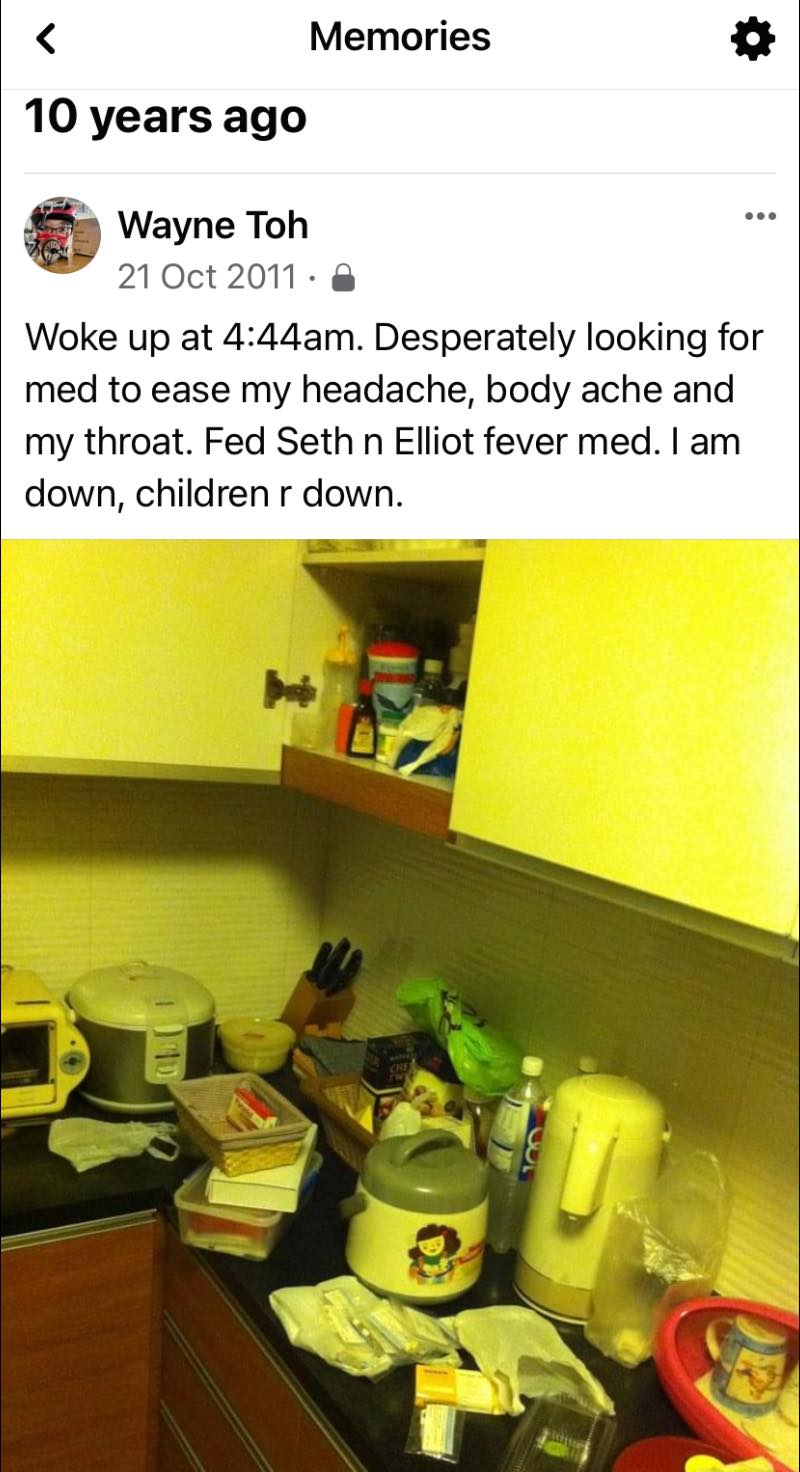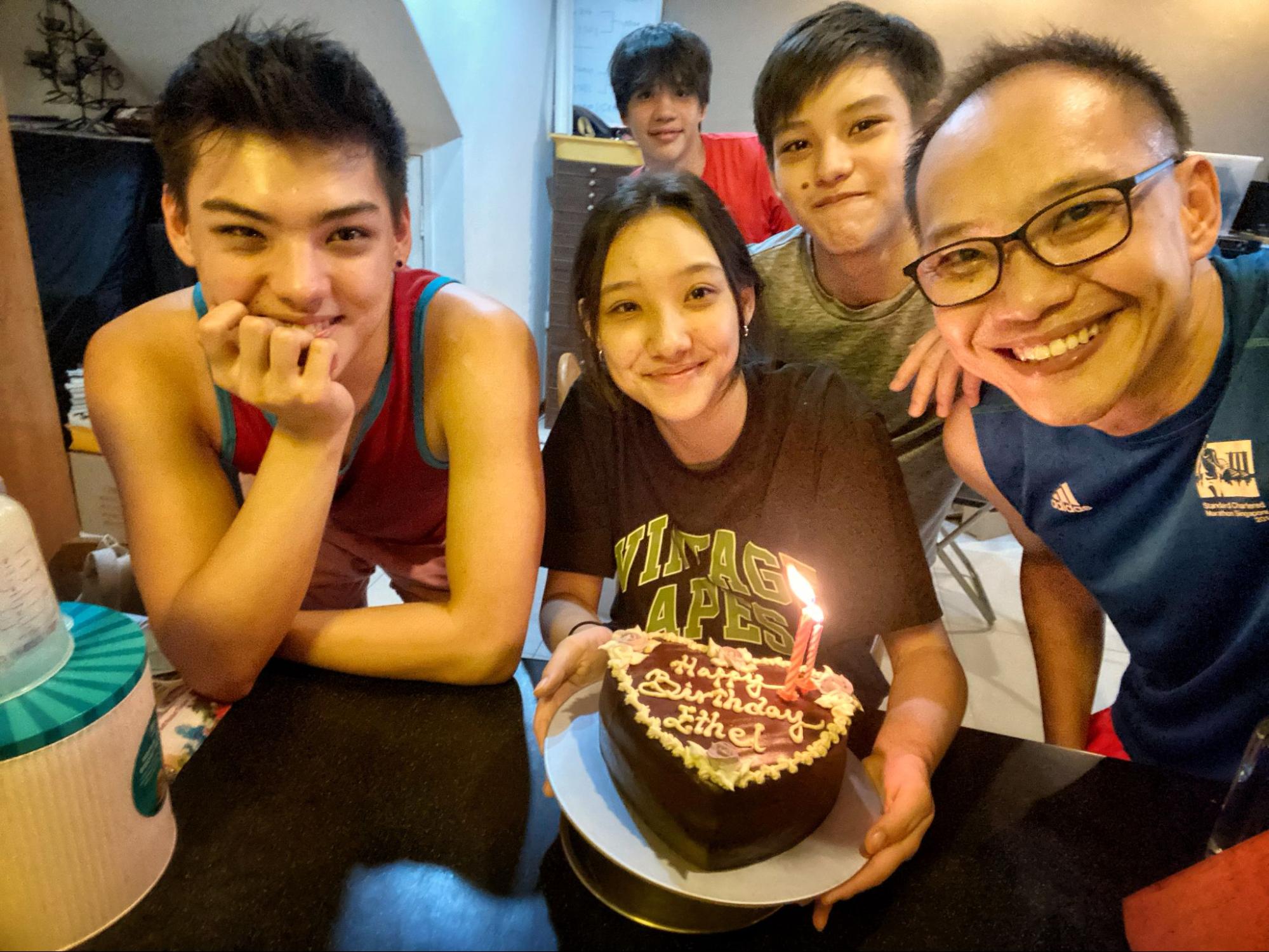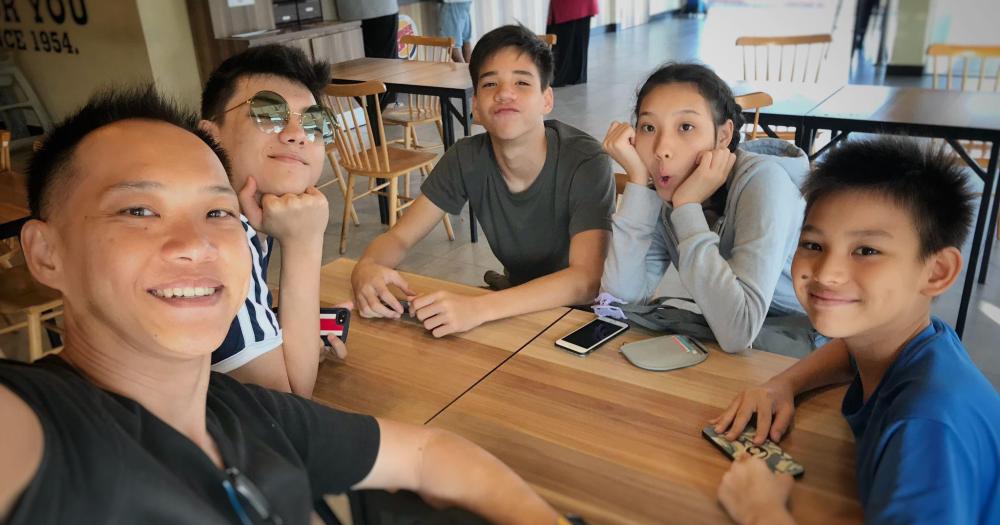It’d be an understatement to say that Wayne Toh, father of four, has been through a lot as a single father over the past 12 years.
In 2010 his ex-wife up and left, handing over custody of their four young children and signing away her share of their HDB flat.
Her abrupt departure left the family reeling — in shock, confusion, and hurt.
Even today, the end of his marriage is still a sensitive topic for Toh, who says that he’s thankfully not had to talk about it much.
After all, people tend to be more interested in how he manages to not only provide for four children while also caring for them as a single parent.
Today, with his children growing up and growing more independent, the 47-year-old is keen to share his extraordinary experience of fatherhood.
Toh sees this as a way of taking a stand for single parents out there who might be “struggling and suffering” in silence, out of fear that they might face discrimination.
There’s also the fact that, in his experience, sharing his story helps him revisit the past and salvage important lessons from the difficult years now behind him.
He mused:
“As I share, I get to think back. And I get to also reflect on what I had done wrong, or correct. Or what should I do and what I should not do.
So, that will help me to become a better person.”
But as he told me his story — one that spanned more than a decade — over iced tea about a week ago, I got the feeling that Toh wouldn’t be needing much help.
The challenge of raising four children as a single parent
As Toh rightly guessed, I was indeed curious to find out more about the logistics, especially since the children were relatively young (from four to ten years old) when he was left to care for them on his own.
But one of the first things Toh told me is that he is “someone who doesn't really plan too much ahead”.
As Toh described what it was like in the hectic first few years as a single father, I doubted that anyone would fault him for not having the presence of mind to do much forward planning.
In a Facebook post last October, Toh looked back on an episode that took place 10 years ago, in 2011, which illustrates some of the challenges he faced.
 Screenshot via Facebook post by Wayne Toh.
Screenshot via Facebook post by Wayne Toh.
It was a particularly severe bout of sickness that would affect four out of five in the household, including Toh himself.
Toh wrote in his post:
“I remember I sat at my IKEA lazy chair as I watched over Elliot on the floor with his dirty mattress in the kitchen and the messy kitchen top thinking to myself… I cannot give up. I repeatedly thought about it until I fell asleep.”
This steely resolve is no doubt a big part of what has brought Wayne through the tumult, to where he is today, but resolve alone was not enough.
Falling sick often, lacking proper nutrition and sleep
Toh shared that in the first few years as a single parent, he would fall sick often.
This had something to do with his lack of sleep — he would often find himself dosing off while waiting to pick up his children after classes, even if he only had 10 to 15 minutes.
He would also skip meals so that his children would have enough to eat. Needless to say, this didn’t help his poor health.
To make matters worse, Toh had quit his job as a teacher and started a new photography education business just before his divorce.
“I cannot fail”
Toh recalled his mindset in those early years:
“In the beginning, I wanted to prove to myself that I can do it.
Because I tell myself that I cannot fail. Why? I just started my business, ‘I cannot fail.’ Then when she walked out on me, the kids were all dependent on me, ‘I cannot fail.’…
I kept telling myself, ‘I cannot give up.’”
The stressful situation was further compounded by the fact that his usual outlet for stress relief — running — was no longer a peaceful escape.
“It was quite tough because I used to run with her. We used to jog at night. Then when she left, it was very tough to continue running, because I am alone, you see.”
Toh recalled how he would set off for evening runs after putting the children to bed.
“I’ll come back quite late, because [at] that period of time, I was very, very low. Low morale.
Runs would take me about 45 minutes to an hour, but after I’d finished my running I’d just sit where I stopped. Either I’d grab dinner, or buy a drink to hydrate myself, and then I would just sit there until I’m totally dry, then I’ll walk home.”
“Yeah, it [was] like, quite aimless,” he said grimly.
Distraction only a temporary solution
Toh resorted to listening to music while running, but eventually realised that distracting himself from painful reminders of their time together was only a temporary solution.
“I know that I have to face it,” he said. “I realised that I cannot let that affect me to the extent where it becomes a fear.”
With that, he started to bring the children to familiar places that they would visit together as a family — the swimming pool, the beach, the playground.
“I started to resume these activities. Because I realised that the kids needed that kind of outlet, as much as I also needed my break.”
 The four children playing at the beach. Photo courtesy of Wayne Toh.
The four children playing at the beach. Photo courtesy of Wayne Toh.
With that realisation, Toh made the call to scale down some of the enrichment classes that his children had enrolled in prior to the divorce.
He also arranged for them to be transferred over to the school where he was teaching, which made transport arrangements that much easier.
And if the kids ended school before Toh was ready to leave, his teacher colleagues would bring them to the library, and even read to them on occasion.
All of this helped ease Toh’s load, giving him more time to rest.
Trying to “fill in the emotional gap”
Noting that his children had different strengths and interests, Toh would arrange to spend one-on-one time with each of them — ”for me to spend time with them, like 100 per cent focus on them,” he explained
As the kids got older, Toh would let them choose how they wanted to spend that time, even if it meant that he had to sit down for Happy Meals four times in the same day, or watch the same movie two or three times. (“Either Iron Man or Spiderman”, was all Toh could recall though.)
On a more serious note, Toh explained that these activities were his way to “continue to fill in their emotional bank”.
He packed the family’s weekends with activities, even though this was “just exhausting”.
“I became so dry, I became so drained, I became so empty,” he said grimly. “That’s when I started to have suicidal thoughts. Because it was really very empty — I was running on an empty tank.”
Letting it out, to keep it together
There were many Friday nights that rolled into Saturday mornings.
“Because I just can’t sleep. Saturday morning, five plus, six, I will just take my passport and drive to Malaysia leaving the kids. Because I just cannot take it.”
These long drives, down long expanses of highway just across the border, were cathartic for Toh.
“I would literally hold the tears until I’ve crossed the customs, [and once I] hit the highway I'll just burst out…
I would cry, I would play music — Christian songs lah — and pray at the same time.”
These drives, Toh said, were what helped him keep his sanity.
While Toh had no qualms showing his emotions at home, he was conscious that he needed some time and space on his own, away from them.
“The children have seen me crying. They’ve come around me, they’ve hugged me, and said ‘Daddy, we love you,’ that kind of thing.”
But Toh felt that he needed to find his own ways to keep his emotions in check, to be able to provide them the affirmation that “even though mummy’s not around, life still goes on”.
And life did indeed go on.
 The Toh family, celebrating a birthday. Photo courtesy of Wayne Toh.
The Toh family, celebrating a birthday. Photo courtesy of Wayne Toh.
Knowing his limits, and trying his best nonetheless
In a 2013 video interview for a project titled “Singaporean Of The Day”, Toh described his view of single parenthood as such: “Now I’m the father, I’m also a mother”.
Intrigued, I wondered if he still held the same view today.
“Yes and no,” he answered, maintaining that he has been able to play some aspects of both roles.
“But once [they] hit a certain age — like my daughter — there are certain things that I can’t do with her– not that I can’t do, but because she doesn’t want me to do with her… for example, shopping.”
“I was thinking, like, I want to be the cool dad, but no, I failed!” he said, laughing sheepishly, before adding that he is nonetheless glad that he tried.
“It’s not a can-do kind of [thing]. It’s more like, can try to do,” he laughed.
That’s the attitude he applies to other aspects of filling in as a stand-in “mother” — such as cooking, which was previously his ex-wife’s domain.
While he said his children have grown tired of his “simple food”, it’s clear that this is an area where he has invested some effort.
“It’s not what I do not have, but rather, what I have, and what I do with what I have that matters,” he added, musing that this is an attitude he’s applied across his personal and work life as well.Continuing the journey of parenthood
When asked for his parenting philosophy on the other hand, Toh quickly responded, “to be honest, I’m still learning”.
While the children are now a lot more independent, that doesn’t mean that parenting has become a simple, hands-off affair.
He’s still trying to figure out how best to communicate with his teenagers, aware of the fact that while he was once a teen himself, his children are growing up in a very different world.
But Toh has more time for himself — and his cycling hobby — these days.
He also still tries to stay in touch with his children through one-on-one time, though it seems like their schedules can sometimes be busier than his.
“At times I am amazed by my life itself,” wrote Toh, looking back on past interviews in a Facebook post last September.Toh’s children, now aged between 16 to 22, are approaching or in the midst of tertiary education, and he talks about each one’s progress and achievements with pride.
“I may not be successful in life, but because of what I'm doing, my sacrifices, and my children can be successful, then I'm actually very successful.”
This sponsored article by the Alliance for Action to Strengthen Marriages and Family Relationships made the writer think about how one can draw strength from family bonds.
Quotes were edited for clarity. All images courtesy of Wayne Toh.
If you like what you read, follow us on Facebook, Instagram, Twitter and Telegram to get the latest updates.
